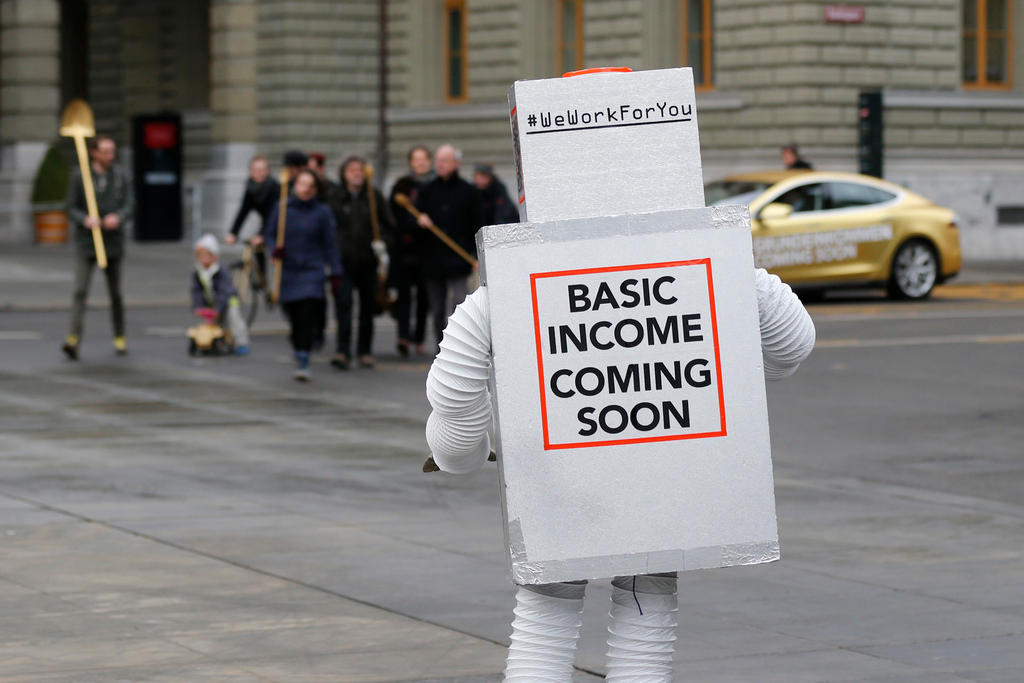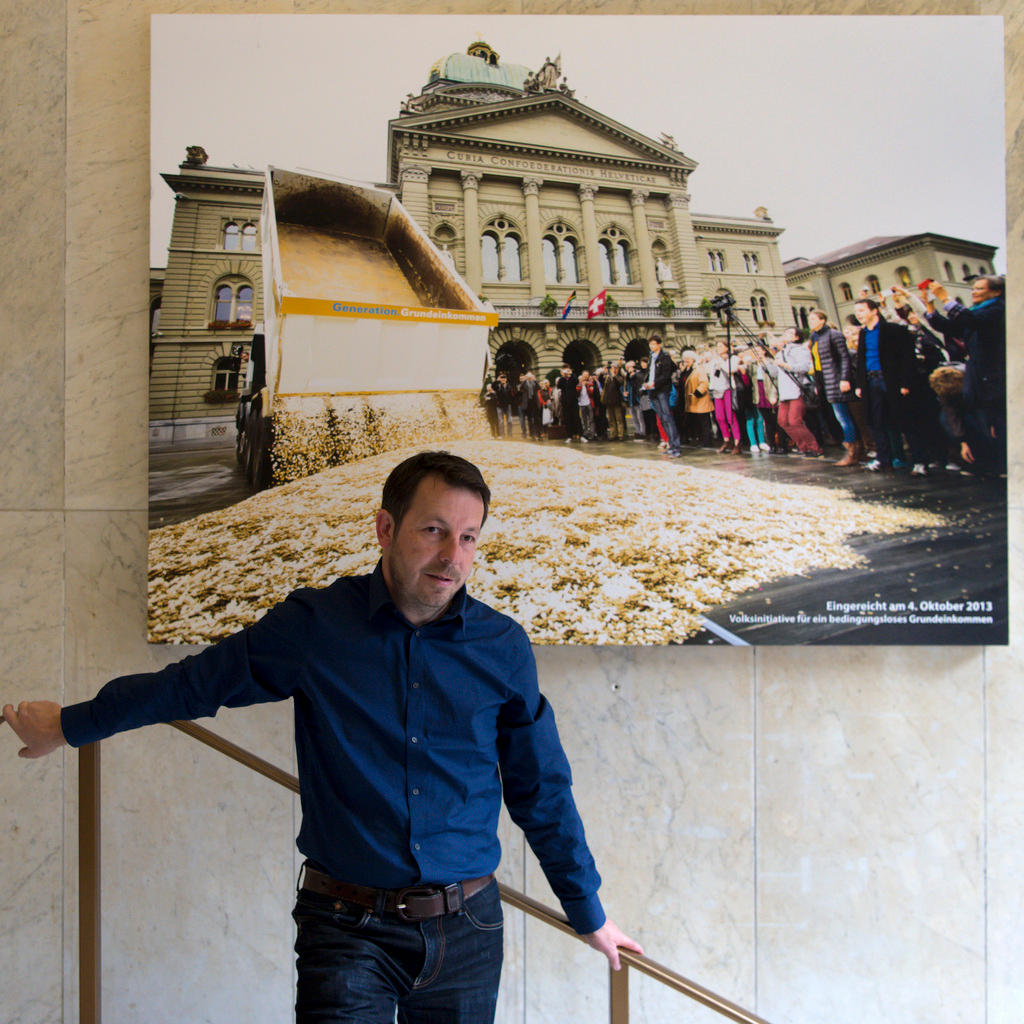Direct democracy’s happy losers

A year after the nationwide vote, hardly anyone is talking about the controversial topic of unconditional basic income for all in Switzerland. Not so in other parts of the world. The Swiss initiative's backers see this as a reason to rejoice.
Finland is trying basic income out, the concept is a part of the governing coalition’s platform in the German state of Schleswig-Holstein, and in the United States, two big names in the high-tech world actively favour the idea.
Nevertheless, the fate of proposal No. 601External link must rank as one of the worst defeats in the annals of direct democracy in Switzerland, according to official records. The people’s initiative, “for a unconditional basic income”, was supported by just 23.1% of voters on June 5, 2016.
In not a single one of the 26 Swiss cantons did the proposed constitutional change win a majority.
This article is part of #DearDemocracy, a platform on direct Democracy issues, at swissinfo.ch.
The initiative called for traditional social welfare payments based on need to be replaced by a single “citizen’s allowance”. In other words: everyone in Switzerland should get an income of CHF 2,500 ($2,590) per month. Just like that.
“Successful defeat”
It was surprising, and irritating too, that the proposal’s backersExternal link still seemed upbeat following the crushing defeat at the polls. “Democracy is not a game where there are winners,” commented Daniel Häni, the brain behind the initiative, adding: “the debate goes on, at an international level.”
A year after this “successful defeat,” Häni has not changed his view. The 2016 result has to be respected, #DearDemocracy was told by the 51-year-old businessman, who has been running Switzerland’s biggest coffee-house in Basel since the early years of the millennium. For him,”basic income brings together social heart and liberal reason”. He does admit, however, that there is little enthusiasm in Switzerland at the moment for the idea.
Not so in other parts of the world. “Our initiative has been a stimulus to the worldwide debate,” Häni believes. He is often invited to speak in German-speaking countries in particular, and fellow backers, like artist and filmmaker Enno Schmidt, travel the world and are important links in the global network for an unconditional basic incomeExternal link.
Democracy mirrors society
Häni explains the initiative’s success in terms of the close relationship between the idea of a unconditional basic income and the practice of modern direct democracy.
“In both cases, it is a matter of self-determination that go beyond ideologies of the left or the right,” he says. “Democracy mirrors society. It demands nothing itself. It just indicates what people want.”
Due to its well-developed direct democracy system, Switzerland has succeeded in putting the dichotomy between paid work and individual freedom on the world’s agenda.
The initiative’s backers scored several spectacular publicity coups during their campaign. When the signatures collected for the initiative were officially turned in on October 4, 2013, eight million shiny five-centime coins were emptied out on the square in front of the government buildings in Bern – one for each citizen, that was the symbolism.

Then in Berlin, at the Brandenburg gate, one week before the national vote in Switzerland, activists unrolled a huge, 450-metre-long banner that said in English: “What would you do if your income were taken care of?” – that was their question to the world.
Stunts like these meant that the promoters of the Swiss initiative were able to strike a chord internationally with their call for public debate on a basic income.
Worldwide
In the US, two leading figures in the brave new world of digital tech have recently come out in favour of some kind of no-strings-attached basic income: Mark ZuckerbergExternal link and Elon MuskExternal link, the founders of Facebook and Tesla.
In Finland since the beginning of this year a thoroughly pragmatic two-year pilot project has been running at the behest of the conservative government: 2,000 people selected by lot are to receive the equivalent of CHF 600 per month; the only condition is that they have to be long-term unemployed.
In Schleswig-Holstein, the German federal state adjoining Denmark, the new right-left coalition in power (consisting of Christian Democrats, Liberals and Greens) have agreed on a “citizen’s allowance” pilot projecExternal linkt as part of their programme for government. Another project has started in Germany too: each month there will be a lottery among all German citizens to win an unconditional basic income of €1,000External link, financed by crowdfunding.
Another indication of international interest can be found at swissinfo.ch. We ran a series of articles on the basic income proposal last year under the #DearDemocracy hashtag. Hits increased rapidly on the Italian, Japanese and Russian-language pages in particular.
Broad coalitions for and against
As happened in the run-up to the national vote in Switzerland, there are now broad-based coalitions worldwide for and against the idea of a basic income. Advocates are often socially liberal business people, artists and democracy activists. Opponents are often trade unionists and politicians with a conservative view of public finance.
Since the open discussion and proposed solutions make many people wary of the idea – as was the case in Switzerland – unconditional basic income proposals are likely to have a tough road ahead of them elsewhere too.
But the topic is not going to go away. It is not just that, on an international level, discussions are getting broader and pilot projects are getting more numerous as time goes on. In an opinion surveyExternal link, carried out by polling firm gfs.bern in 2016, 62% of Swiss queried were of the opinion that the basic income issue was not completely over, despite the vote result. So it seems that it is not only the winners of the campaign who have reason to be pleased, but the losing side too.

In compliance with the JTI standards
More: SWI swissinfo.ch certified by the Journalism Trust Initiative












You can find an overview of ongoing debates with our journalists here . Please join us!
If you want to start a conversation about a topic raised in this article or want to report factual errors, email us at english@swissinfo.ch.